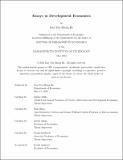Essays in Development Economics
Author(s)
Ho, Lisa Yen Zheng
DownloadThesis PDF (7.643Mb)
Advisor
Duflo, Esther
Olken, Ben
Atkin, David
Schilbach, Frank
Terms of use
Metadata
Show full item recordAbstract
This thesis comprises three chapters. The first essay studies the effects of flexible work arrangements on female labor force participation in West Bengal. The second essay considers the effects of mobile internet on educational outcomes in Brazil. The third essay examines how information about the carbon footprint of different foods affects meal choices in the United States. The first chapter, joint with Suhani Jalota and Anahita Karandikar, studies the causes and consequences of persistently low female labor force participation rates in India. Across the world, several hundred million women say that they want a job but are out of the labor force, often because available opportunities are incompatible with norms about their household roles. In a field experiment with 1,670 households in West Bengal, we over flexible, short-term data entry jobs which meet households where they are in terms of expectations of women’s domestic responsibilities. We find three sets of results. First, flexibility more than triples job take up, from 15% for an office job to 48% for a job that women can do from home, while multitasking with childcare, and at the hours they choose. Second, to better understand why employers might hesitate to o er greater job flexibility, we study effects of work-from-home on performance and find negative effects on work quality and speed. Third, flexible jobs act as a labor market gateway for women initially out of the labor force: experience with flexible jobs makes women more likely to accept less flexible and outside-the-home jobs in the future. This gateway effect may be explained by changes in attitudes about appropriate behavior for men and women. Flexibility makes a larger difference to the labor supply of women who hold more traditional pre-intervention attitudes, and work experience in turn shifts women and children’s gender attitudes to become less traditional. Thus, flexible work arrangements can both attract women to the labor force and provide a gateway to less flexible jobs. The second chapter, joint with Pedro Bessone and Ricardo Dahis, studies the impacts of Brazil’s staggered mobile internet rollout on children’s educational outcomes. We compare standardized test scores before and after the staggered entry of 3G into Brazil’s 5,570 municipalities using a heterogeneity-robust event-study design. We find no effects of mobile 3internet on test scores for 5th or 9th grade students and can reject effect sizes of 0.04 standard deviations in both math and Portuguese. Taken together, our results indicate that the arrival of high-speed mobile internet is not sufficient to improve educational outcomes either through direct take-up by individuals or through broader changes to the economy. The third chapter, joint with Lucy Page, examines the adoption and effects of carbon footprint labelling by firms in the food sector. Food systems account for approximately one-third of total greenhouse gas emissions, and simple shifts across food choices can yield large cuts in emissions. In a randomized field experiment with over 200,000 meal kit customers in the US, we find that carbon footprint labels cause customers to choose lower-emission meals, and that the introduction of labels has positive effects on customer retention and company profits. Both the reduction in emissions and the increase in profits are driven by customers with high baseline beef consumption. We find evidence that the labels act through salience rather than knowledge, and that the effects on meal choices depend on whether customers’ values are aligned with the goal to address climate change through behavioral change.
Date issued
2024-05Department
Massachusetts Institute of Technology. Department of EconomicsPublisher
Massachusetts Institute of Technology